Free digital copy
Get Speciality Food magazine delivered to your inbox FREE
Get your free copy
Sustainability is no longer a hollow buzz word. It’s something consumers are actively thinking about, and basing their buying decisions around. From the composition of packaging, to ‘clean’ ingredients lists, and being B Corp - they have more questions for producers and retailers to answer than ever before. In this special feature, we speak with eight artisans who have made it their mission to work in increasingly nature-friendly ways.
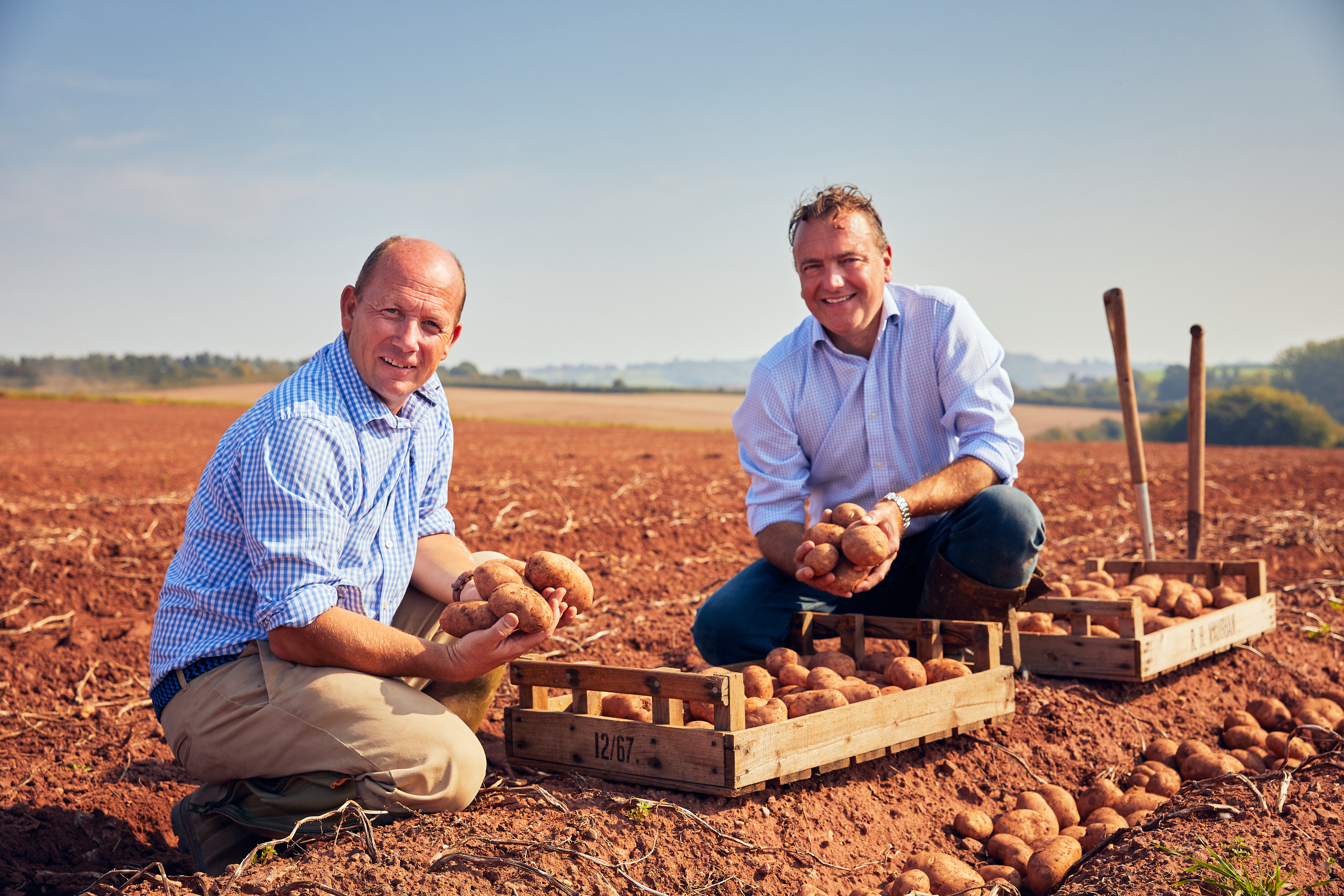
Two Farmers: ‘We’re proud of our innovation in packaging’
Sustainability runs right through the core of Two Farmers – whose crisps are made with the brand’s own potatoes (grown two miles from the factory) using green energy, before being sealed in fully compostable packaging.
Founders Sean Mason and Mark Green have a great deal of pride when it comes to their environmental mission, which began before they even sliced and fried their first spuds.
A key USP for Two Farmers is the brand’s crisp packet, with around four years dedicated to developing a non-plastic option that would keep the products in top condition. Fully recyclable sharing tins (a nice vehicle for homemade bakes after they’ve been used) are also part of the packaging family.
Sean and Mark were adamant they needed to come up with something better than plastic, having spent a serious amount of time managing waste that blew onto the farm from car windows. “That plastic will obviously never break down. We wanted to try and do something to change this,” says Sean. The pair were also mindful of consumers being ever more conscious of their use of plastics.
The process, Sean admits, moved very slowly, and costs were spiralling out of control a year before they launched.
“We never stopped to think they could be too expensive. But then Blue Planet came out about eight months before we launched, and the world perception of what we needed to do changed overnight. We said ‘OK, we’ve got to get this to market now’. We almost had an obligation to do it - although the costs were incredibly high.”
The Two Farmers range consists of Herefordshire-inspired flavours, from Salt & Cider Vinegar (made with their own vinegar), to Hereford Sausage & Mustard, using local rare breed pork.
As far as they are aware, they’re the first crisps in compostable packaging, made from 100% sustainable cellulose from wood pulp, printed with biodegradable ink, and sealed with biodegradable glue. The packets, unlike other eco plastics which will only decompose in a commercial composter, take “between 25 and 30 weeks to break down, depending on the environment they’re in. And the same if they go into the water and into the sea. They’ll break down into biomass, water and C02.”
On the farm Sean and Mark are working towards being carbon neutral in the right way. The most transparent way. This includes generating their own renewable energy on site using solar panels, using high-spec technology to increase efficiency, and green cropping to enrich soil.
“We don’t want to offset anything,” says Sean. “We think offsetting carbon is hiding behind what you’re doing yourselves. We are green cropping and planting trees, and we hope to offset our footprint by the end of this year.”
Greenwashing is something Sean thinks is one of the biggest issues in the sustainability arena. “We feel an awful lot of greenwashing is going on at the moment, and people are hiding behind statements. We found this from day one. We thought some of that might change, but even in the very recent past we have tendered with companies making huge sustainability comments, but didn’t get shortlisted because of cost.
“The government needs to crack down on these companies that are making big sustainability claims but not doing very much really – just ticking boxes!”
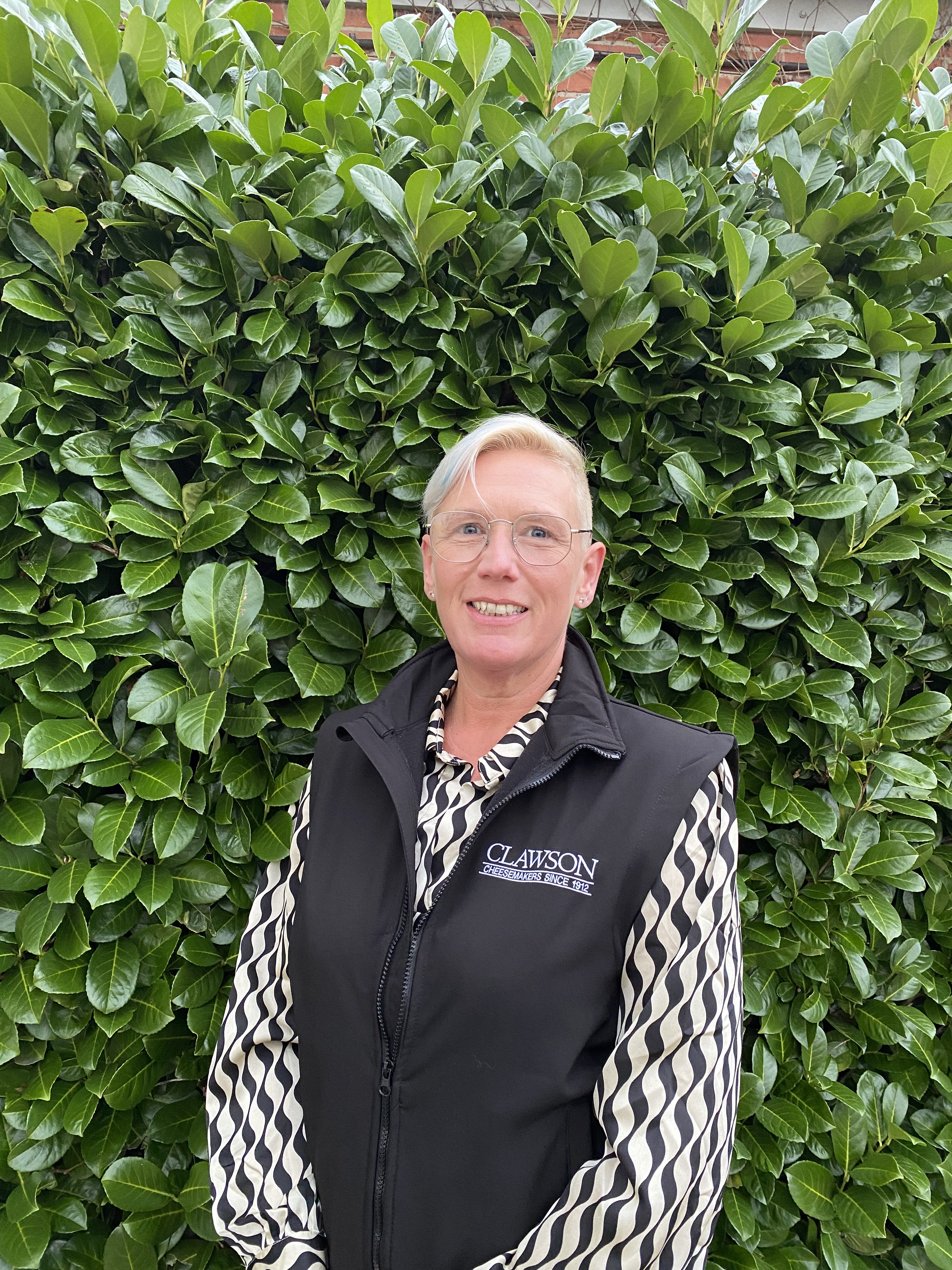
Clawson: ‘We really stand by what we say’
Placed side by side, the hedgerows planted across Clawson’s 33 member farms would stretch 290 miles from the dairy all the way to Glasgow. Now that’s impressive.
This isn’t a throwaway statistic from the cheesemaker, which has seven ‘pillars’ of sustainability in place to ensure it’s being as kind to the environment as it can be, both at the diary, and across its farmer cooperative. These include reducing carbon, looking after animal welfare, biodiversity, water stewardship, reducing plastic, HFSS and community.
“As a business we’ve mapped our Scope 1 and Scope 2 emissions, and have now done Scope 3, from farm to fork. By doing this we know 74% of our business emissions come from the farm, and that’s where we can make the biggest impact,” says technical and sustainability director Annabel McLelland.
In addition to its pillars, Clawson has its ‘big four’ objectives around - feed, fertiliser, future, and fuel. Areas of the business that are being closely monitored.
“We truly care about what we do,” Annabel adds, revealing the emission factor of member farms is 13% below the UK average, and half the global average, with an aim to reduce CO2 emissions by 30% per kilo of cheese by 2032, while also seeking to reduce plastic and carbon from the supply chain. In 2022 alone the business managed to remove 40 tonnes of plastic and card from its processes, something Annabel believes they need to keep pushing on.
Key to minimising carbon output at Clawson is ensuring the cows have an effective diet, and not overfeeding the herds. Grass measurements are taken on-farm to calculate how much is in each field, and how much each animal needs to consume each day to produce just the right amount of milk. Annabel says they are also assessing whether they have “the most efficient cows for our systems.”
With regards to the second ‘F’, Clawson only fertilises land when it needs it, not because slurry pits are full. “We think a lot about soil health, and understand soil and what it needs.”
Fuel-wise many member farms generate energy using wind or anaerobic digestors.
And as for the future?
“At the moment a lot of people are talking about being net zero by 2050, but nobody truly understands what that looks like without having to offset. We are keeping up with the technology available and legislation changes, and we will review our targets. If we achieve that, we will put in another target. It’s evolutionary.”
But it is the right thing to do. “We have to show we care and we really do. Every calf born has a purpose. It does make Clawson more attractive to work for because we really stand by what we say.”
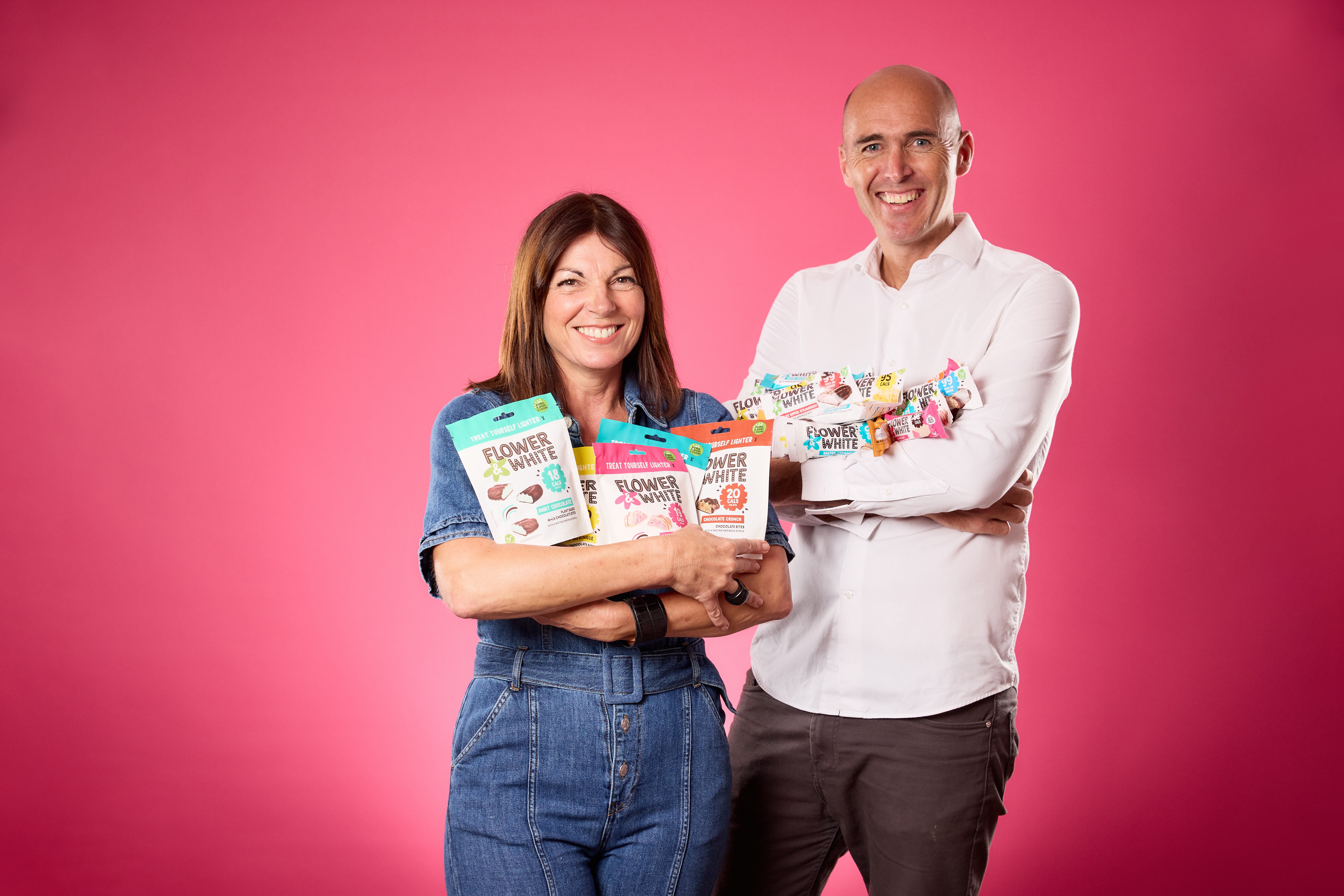
Flower & White: ‘Brands have a responsibility to do the right thing’
Luxury confectioner Flower & White says working in an eco-friendly way makes the team’s job that little bit sweeter.
“In every decision that we make there is always a fundamental principle of embracing sustainability,” says the brand’s marketing executive Imogen Smith.
This extends from packaging, through to having an electric-run company car. Being sustainable isn’t just ‘for show’ at Flower & White. “It’s something we want to do for the planet, and to empower our customers,” Imogen adds.
The brand’s meringue bars and bites are sold in recyclable paper packaging. “We’ve saved an awful lot of plastic from going into landfill,” says Imogen, who reveals Flower & White offers a flavour of the month to online customers, which arrives in biodegradable packaging that’s fooled many customers. “We get a lot of them writing in. They can’t believe it’s made from plants!”
Being plastic free in these product lines is just one of the ways the business is reducing its carbon footprint. In manufacturing, renewable sources are used for electric and gas, and LED movement sensor lights are fitted in every room.
When it comes to sourcing, the brand only uses British sugar and free-range egg whites, and (for products including chocolate) has partnered with Barry Callebaut’s Forever Chocolate project. “It’s a huge thing,” says Imogen. “They focus on helping their farmers, human rights, nature, and ensuring they are using sustainable ingredients as well. The project is aiming to lift 500,000 farmers out of poverty by 2025.”
Taking steps to source only high-quality raw ingredients, and to minimise environmental impact is essential for food producers, Imogen says. “As a brand you have a lot of power in how people think and feel. You’re not just selling a product. You’re selling a lifestyle. We have a responsibility to do the right thing. We have that culture within our team.”
Last year Flower & White started to take strides to becoming a B Corp. “And that’s something that’s driving us and all the decisions we make along the way,” Imogen says proudly. “It’s exciting, and something we really want to accomplish. It’s a bold statement that declares our commitment to the planet.”
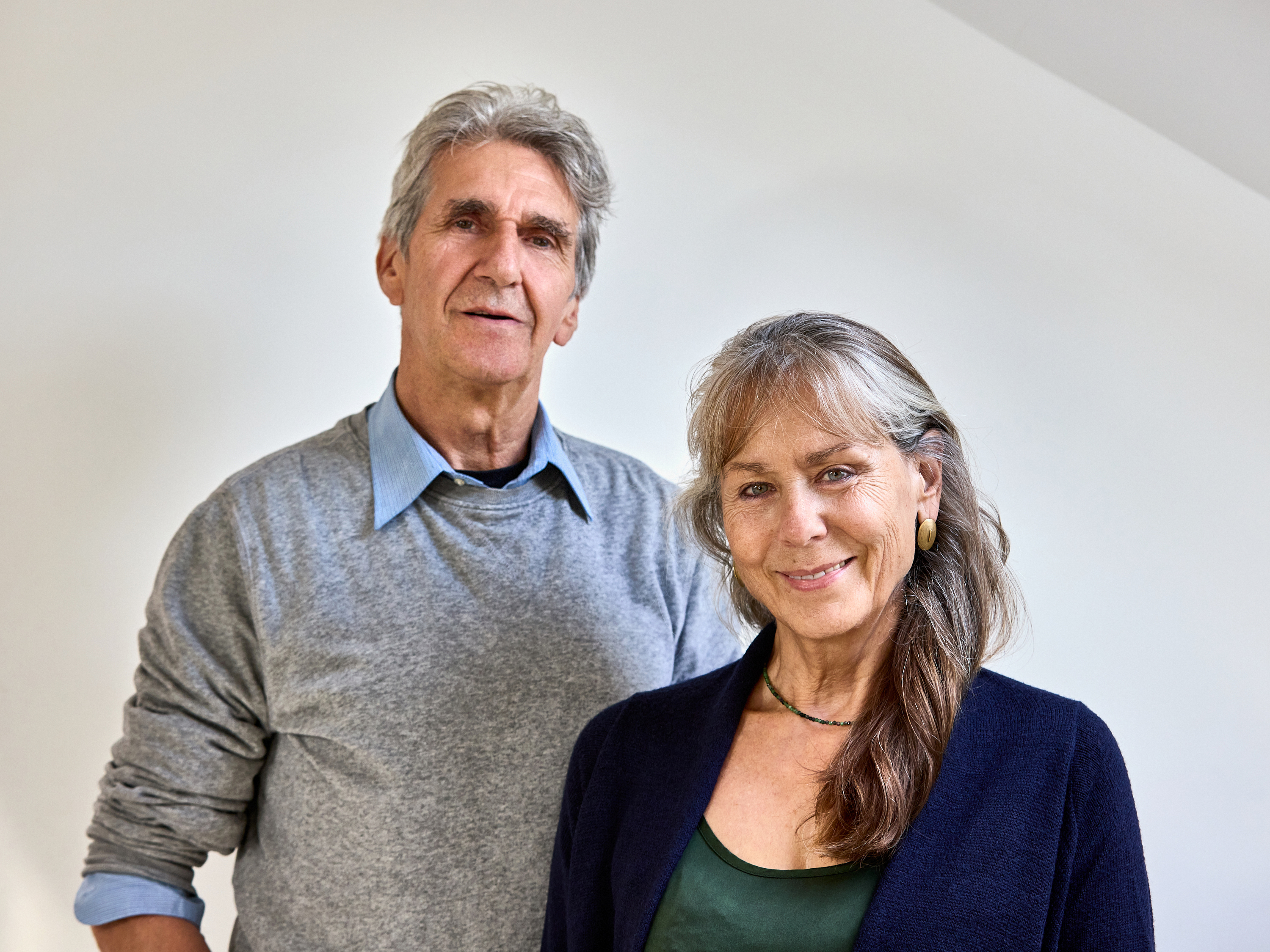
Seggiano: ‘Sustainability has always been high on our list’
Seggiano founders David Harrison and Peri Eagleton recently handed the reigns of their business over to Certified Origins. And the duo are confident the brand will retain its ethos of quality and sustainability – something that has naturally been the essence of the business for three decades.
“There are so many buzz words at the moment,” says David. “Sustainable, vegan, vegetarian, organic, local. That’s always been at the heart of everything we’ve done. People are talking about something that’s always been high on our list.”
Sustainability, he adds, starts with choosing great ingredients, grown in a clean way, by people who really do care.
All of Seggiano’s producers work on a small scale. “There’s nothing industrial about it. It’s all artisans, and they are constantly looking at ways to produce energy,” David explains. “The olive mills Seggiano works with will be using waste from the olive stones for heat. Everybody’s using waste for fertiliser or for energy. Seggiano’s roast artichoke producer is just up the road from me. I jump on a tractor and trailer and collect the artichoke leaves and spread them around my olive groves. All food productions will have a byproduct, and most of that byproduct has a secondary purpose.”
Organic is something else David feels is important, with Seggiano choosing organic ingredients wherever possible. “We all know we are what we eat. There are certain products I think should be organic. Take wheat. There’s so much fertiliser involved in growing wheat, and so much pesticide used storing flour. Using organic wheat, for us, is a no-brainer.”
Seggiano’s slow-dried pasta is made in Sicily using biodiverse ancient organic wheat grains, which are not only more resistant to climate change, but grow deeper roots, requiring less water. The factory takes 90% of its energy from solar panels, and the end product is packaged in paper. This is just one of dozens of success stories for the brand, built on David and Peri’s conviction and tenacity to source only the very best.
“As a brand for nearly 30 years, we’ve been obsessed with provenance,” David says. “You just have to understand every ingredient and sub ingredients. Our ethos was very simple. Would we feed it to our children? If your obsession is to create clean, tasty food, it means you’re also concerned about the world they are growing up in.”
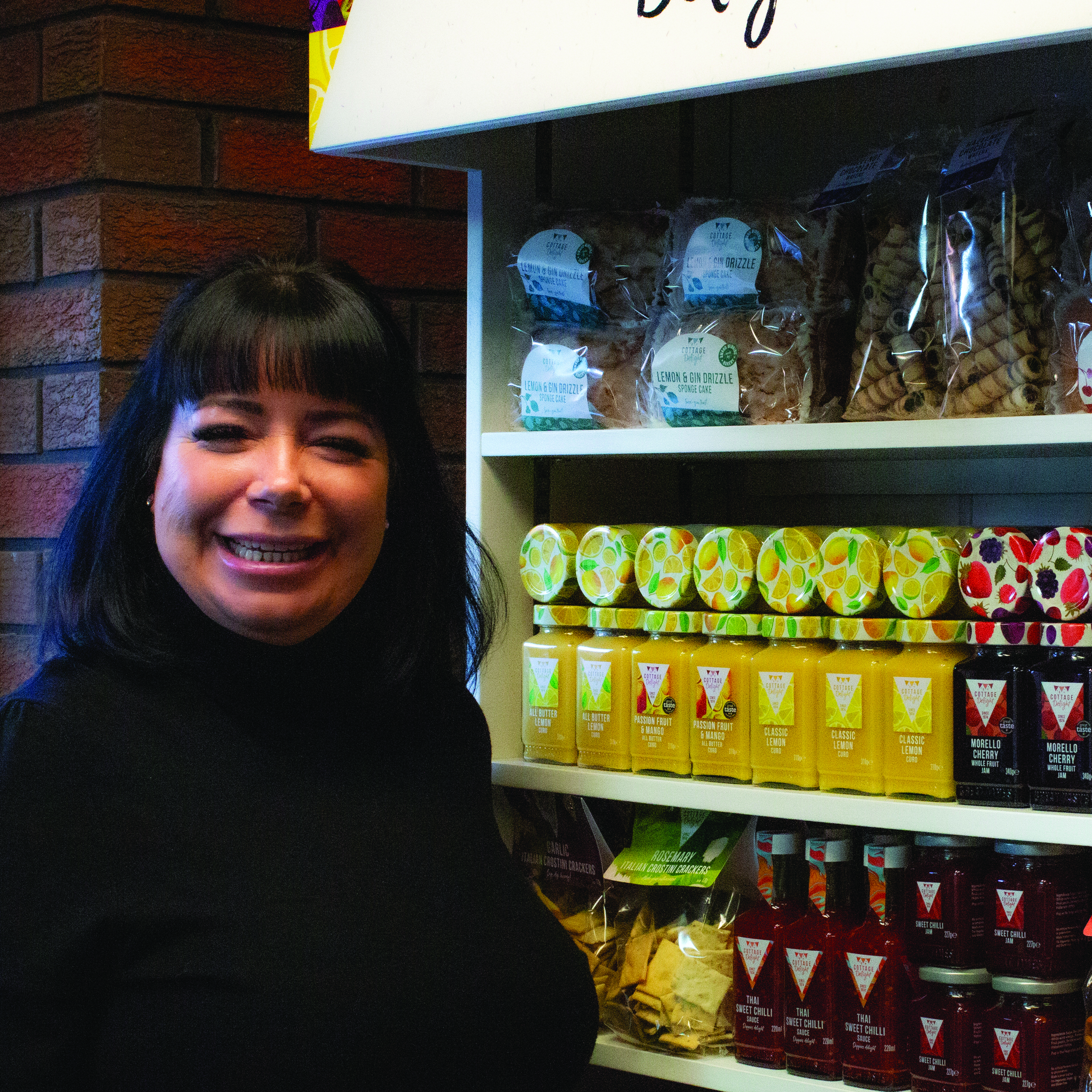
Cottage Delight: ‘Consumers expect more from artisan brands’
“I think there’s an onus on every brand and business to ensure they have sustainability plans,” says Sarah Williams, marketing director at Cottage Delight. “I think it’s very easy for people to say it’s down to the government or organisations to put in regulations, and sort out environmental issues but, actually, businesses and brands are so integrated in people’s lifestyles now that they have to own their sense of purpose…to take ownership of how they are operating to ensure it’s in a sustainable way.”
Like so many others in the artisan sphere, Sarah says Cottage Delight is seeing growing interest from consumers around the environment. It really is impacting buying decisions – especially in food halls and farm shops. “These are the types of consumer who are probably more knowledgeable about food, and want to know more about what they’re buying, who produced it and how they produced it. They expect more from artisan brands. Being sustainable is almost an expectation.”
Cottage Delight was ‘slow’ to the mantel, Sarah admits, but the business has spent the past five years focussing on its journey, making it a strand that weaves through everything it does.
With 2024 being the 50th anniversary of the brand, there are plans to build even further on its sustainable practices. “We want to celebrate what we’ve done, and where we’ve got to, but really, for us, it’s about looking forward to the next 50 years,” says Sarah. “We’ve really taken the opportunity to make big changes.”
This has included dramatically altering Cottage Delight’s recognisable packaging, replacing the mop top and elastic band worn by jars for 30 years with a printed lid. “That’s had a significant impact in terms of waste. It’s prevented 4.8 tonnes of rubber bands from going to landfill in a 12-month period.” Although the mop top has long been part of Cottage Delight’s identity, shoppers are saying they love the more environmentally friendly packaging, which is reducing their own waste at home.
“Another significant thing is we’re trying to get rid of shrink wrap in our business when we deliver stock to the trade,” adds Sarah. “Our glass products now arrive in shelf ready boxes. Retailers can just tear the top off and put them out straight away.”
Working with a printer, the brand has managed to reduce the virgin plastic in its labels by 30%, with a view to move to a completely recycled label in future. “You’d think that would be easy, but it requires progress in technology,” Sarah explains. “At the moment, the material we need doesn’t exist in a fully sustainable form.”
Cottage Delight is zero waste to landfill, with any waste it does generate sent to Peak Waste, which specialises in converting it to fuel.
All the measures the brand has put in place are really beginning to stack up. At the end of 2023 it baselined its carbon emissions to give the team a point to progress from. “We are now in the process of working to a plan to reduce our carbon footprint. We’ve set ourselves a target for the coming 12 to 24 months, with the aim that 100% of our electricity comes from renewable sources,” says Sarah.
Cottage Delight is also sifting through its supplier list. “We’re very conscious as a food manufacturer that we’re one of the industries where a lot of ingredients come from a lot of different countries. You do have to be careful about modern slavery and forced labour. Often ingredients come from underdeveloped countries, and that’s big on our radar. We always ensure with our suppliers there’s a modern slavery policy in place. That’s our first step to making sure we’re working with ethical suppliers and is part of a bigger piece of work going into the supply chain to really understand the credibility further down that chain. That really is important to us,” says Sarah.
Island Bakery: ‘We want our products to be the very best’
Dawn and Joe Reade, founders of Island Bakery, never set out to be food producers. In fact, says Dawn, it was a huge sidestep from their uni days, studying geography. But something about ‘organic’ just ‘clicked’ for both of them. “At the time, in the late 90s and early 2000s, organic was very much in ascendency. It’s something we were interested in.”
The couple set up a traditional bakery. But with trade booming in summer and slowing in winter, decided to create a product they could sell year-round – landing on biscuits.
They noticed a gap in the market for artisanal, organic products in this category, and set about sourcing ingredients from organic suppliers, going on to craft completely natural, additive and preservative-free luxury biscuits. Of course, the premise took off, and biscuit manufacturing outgrew their bakery, with that arm of their business sold in 2007.
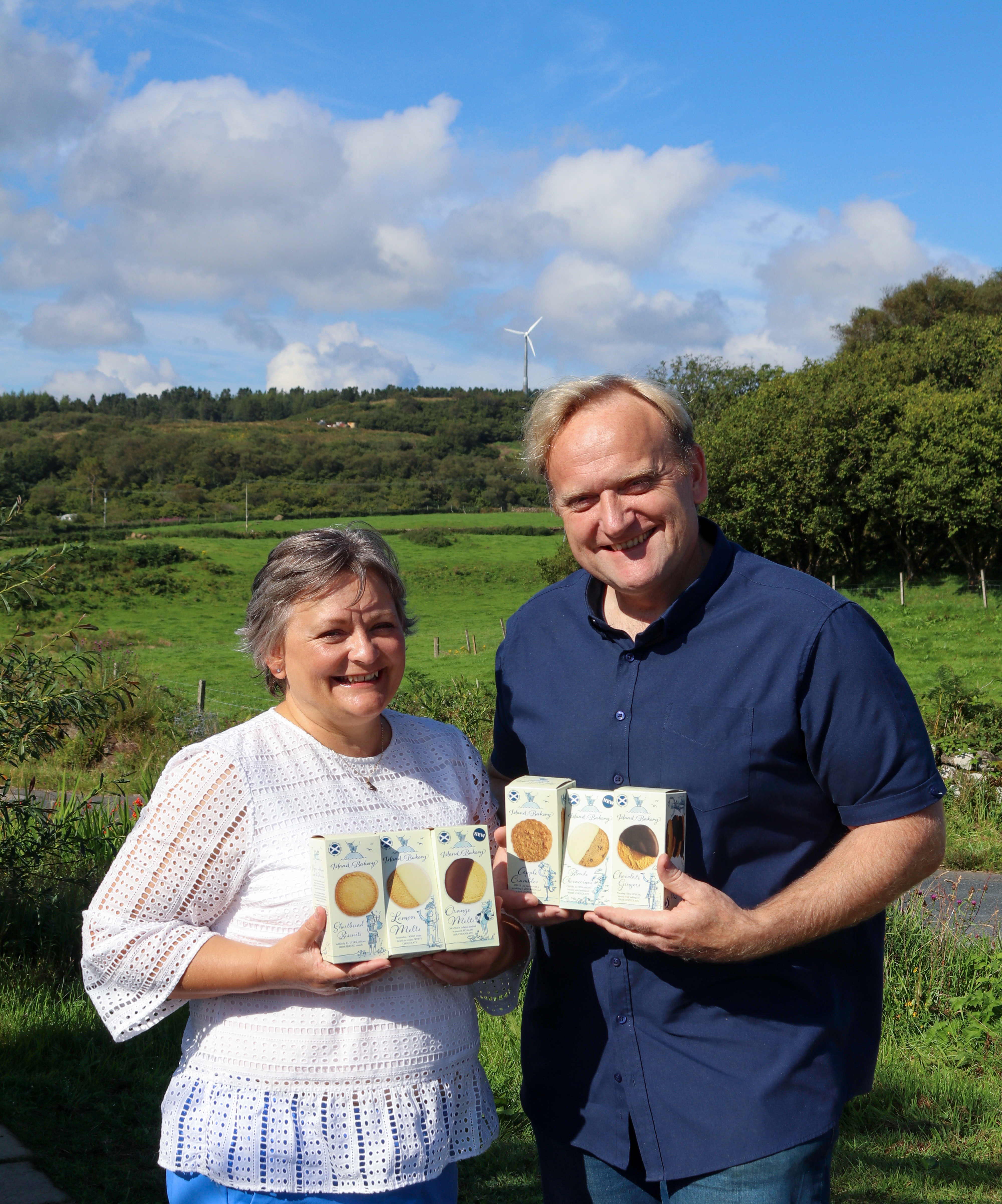
At the point of serious growth, with new premises on the cards, Dawn says they had an opportunity to think carefully about energy, fuel and their eco credentials. “Rather than plugging into our existing energy provider we decided to design the factory around sustainable energy. We use woodchip to heat our ovens, our water, and our house. The wood is all from the island. There’s a lot of forestry here, so we can buy it all locally.”
Island Bakery has also been able to tap into energy from both hydro-electric and wind turbines at neighbouring Isle of Mull Cheese, owned by Joe’s brothers.
The brand is hoping to go B Corp in the near future, with strides being made not just in energy sourcing, but packaging too, with Dawn saying they are as eco-friendly as they can be at the moment in this regard…but that industry technology needs to catch up.
“At first we used plastic trays, but we replaced those with little paper boats. Although they cost more and are heavier and more difficult to store, they trump plastic. We still have a plastic flow wrap. We looked at compostable alternatives, but for biscuits that needs to be completely airtight, and the film doesn’t perform as well.
“We feel compostable films on the market at the moment are a bit ‘greenwashy’ for a number of reasons. The main one being the huge amount of energy used to produce them, which may not be green energy. And unless you industrially compost them, these films don’t break down. If they float away into the street they behave as plastic. They rely on perfect recycling from the consumer. More improvement in technology are needed. People are,” Dawn thinks, “too easily fooled into thinking all plastic free is good, but they don’t look behind the actual story.”
Island Bakery continues on its environmental journey, and it’s one Dawn says is very important for all artisans. “Unless you’ve been in a dark cave for 20 years, I think it’s something everyone is aware of. And because people are more interested, it’s in business’s interests as much as anything to try to be sustainable. We’re proud of what we do here. This is a beautiful place. People come to watch wildlife and go on outdoor adventures. We wouldn’t want to be choking it up with waste.”
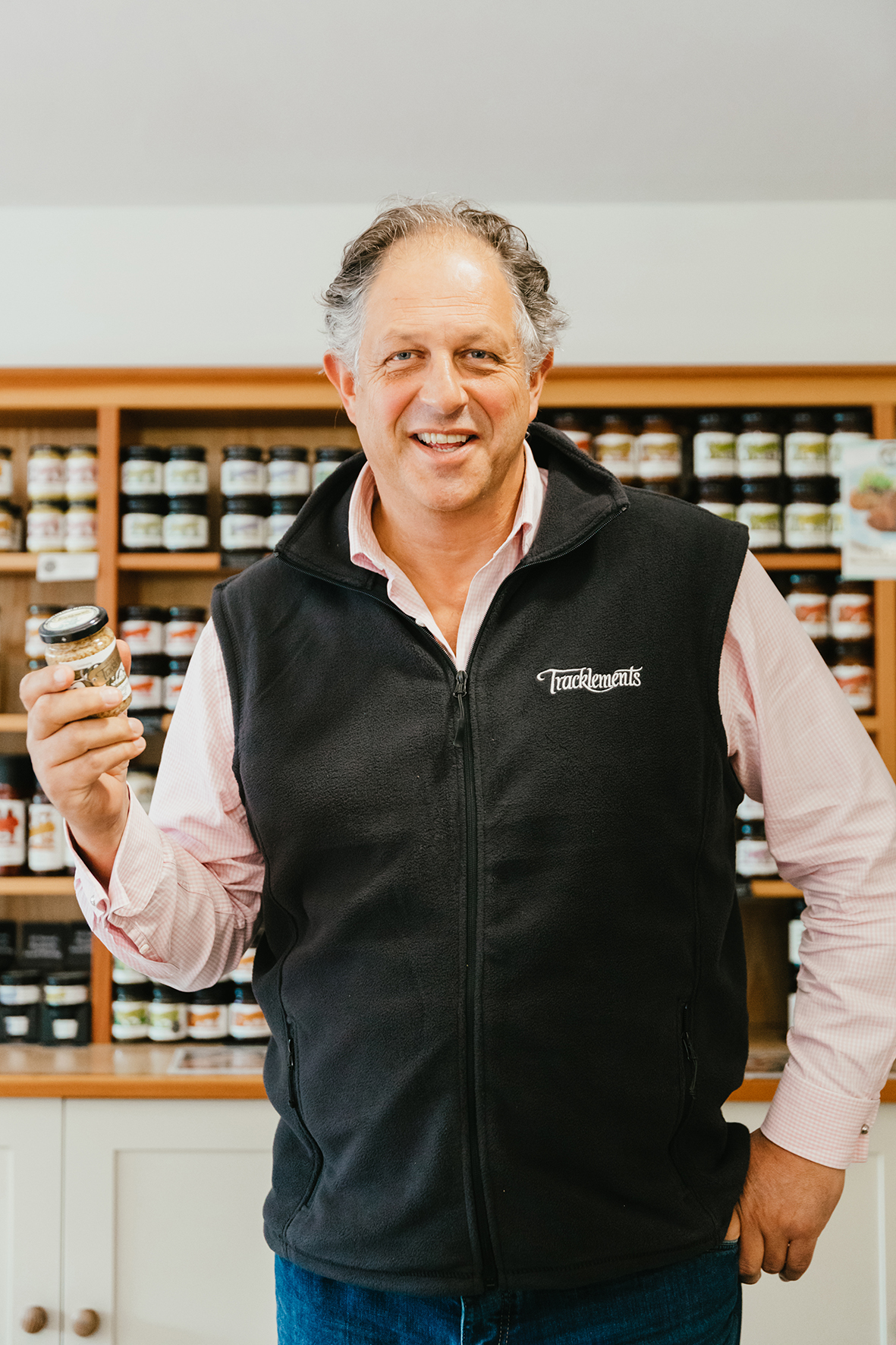
Tracklements: ‘Artisan manufacturing needs to be protected and sustained’
For Tracklements MD Guy Tullberg (pictured) sustainability factors into almost every decision-making process.
“It’s one of the reasons we set out on our B Corp journey three years ago,” says marketing director Becky Vale. “We felt we needed to be tested. We need a standard to aspire to, to be sure we are doing all the right things. That runs quite deep at Tracklements. We really believe that you have to be authentic, and do what you’re saying.”
To date, the chutney, relish and preserves brand has put in 10,000sqft of solar panels, generating electricity. The site cleans its own waste water. All its jars are 30% recycled glass, with recyclable paper labels and recyclable ink. Tracklements is zero to landfill, with 50% of waste recycled and the other 50% repurposed or incinerated and turned into electricity. “And we have a plan to improve on that,” Becky explains. “So that we’re much more recycled and less repurposed. It’s a journey we’re all on together, and it’s about learning and improving as we go.”
One of the brand’s most important views on sustainability, says Becky, extends to farmers and growers. “As a business, we can be really sustainable,” she explains. “But if we don’t have a sustainable source of, say, freshly grown British horseradish, or if we don’t keep paying the person who pulls vegetables out of the ground a fair price, we lose that great quality. We have a very clear strategy in that we are very honest with everyone. We source locally first, then regionally, then nationally and internationally. But it’s always the best.
“We see it as a self-supporting cycle. If we don’t support the environment, and growers and people, what will we have in the end? We always used to talk about Fairtrade, but it’s this idea that you need to protect your supply chain, so their business is also sustainable, which makes your business sustainable, which is good for the end consumer.”
A product that couldn’t be more local if it tried is Tracklements’ English Crabapple Jelly. School children near the HQ pick up windfalls and pass them on to the preserve maker in return for money. Then 25p from the sale of each jar goes back into the school. The fruits are all picked within a five-mile radius of Tracklements. “It’s a wonderful way to be part of the community, trying to teach the next generation where food comes from and how an artisan manufacturer turns it into something delicious,” says Becky, adding, “One of the other things Tracklements is trying to do is create this idea that artisan manufacturing needs to be protected and sustained. We need keep teaching people how to make things, and to make them really well.”
Being sustainable “just makes good business sense” according to Becky. “It’s moving up the agenda for a lot of producers and it should go without saying that any artisan business should be sustainable. I was listening to someone recently who said ‘if you’re not sustainable, you won’t be around, it’s the future’.”
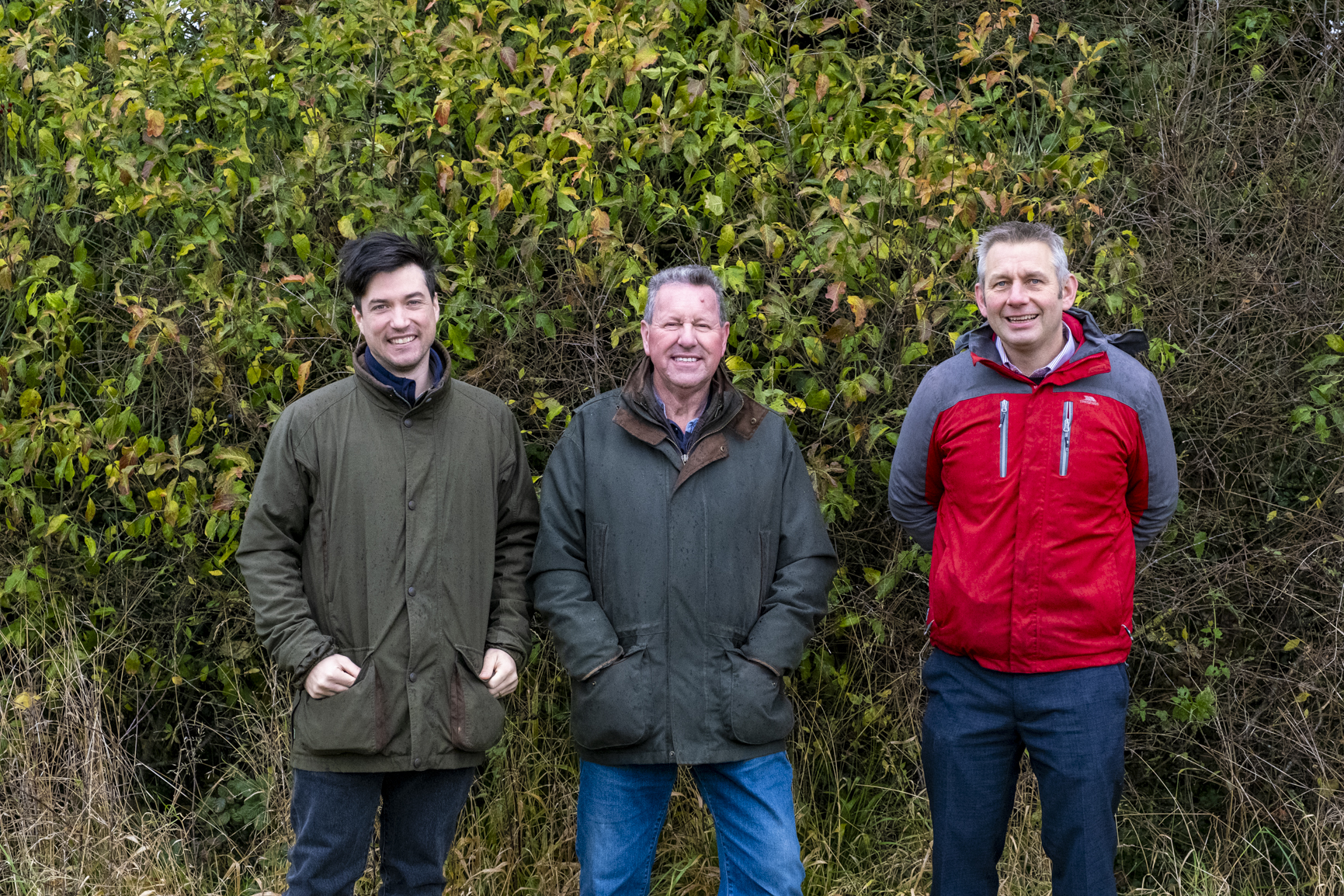
Summerdown: ‘Producers need to listen to and integrate with nature’
In the height of harvest season, the fields of mint and lavender at Summerdown (producer of fine chocolate mints and teas) come alive. Butterflies and bees drift through the crops. Tiny mammals forage in the undergrowth. And birds, including the Red Listed Stone-curlew, take shelter.
The Hampshire farm was one of the first in the UK to participate in the RSPB’s Fair to Nature programme, enabling producers to grow in a way that’s mutually beneficial for wildlife, and their businesses.
B Corp certified Summerdown’s ‘master of mint’ Ian is a founder member of the initiative and, says head of sales and marketing, and grandson of Summerdown creator Sir Michael Colman, its principles really do underpin the brand’s approach to sustainability.
“Caring for the environment is a deeply held passion of Ian’s,” Jo says. “It’s fully integrated into our farming system.” But working this way isn’t a new thing here. “From the beginning it’s been our family approach,” Jo adds. “As we built the brand and the business on the farm, sustainability was key. We very much see ourselves as temporary stewards of the land. It was here long before us. There’s mention of the farm in the Domesday Book, and we know as long as we look after the land and care for it, it will live on long after us.”
How nature will be impacted underpins every decision the team makes, with Jo pointing out Fair to Nature’s strapline as something that sticks with him: ‘without nature there is no food’.
The main focus of Fair to Nature is to maintain a variety of habitats. At Summerdown there are 5-meter wildflower and wild grass margins on all fields, enabling invertebrates, pollinators and small creatures to have a place to live and feed. And Jo is proud of the amount of woodland they manage. “We’re making sure that’s maintained as much as possible as a corridor for nature to move. We see the farm as part of an ecosystem.”
All the habitat preserving measures undertaken at Summerdown are having a huge impact not only on bird and insect life, but Jo says they have noticed rare wildflowers thriving, and they’re excited to have their next plant life survey done (the last was a decade ago).
One of the things he appreciates about the scheme is “that it is rooted in rigorous and verifiable scientific research and evidence and not trying to force outcomes. How we work as a farm is being measured, not the outcome. We know that creating habitats and protecting nature the outcomes are all positive.”
Indoors, Jo reveals a big piece of work is continuing into rescoping the entire sustainability strategy within the business – in particular around packaging, which he says can be frustrating. “We want to move away from plastic trays, but we haven’t yet found a viable alternative that was value for money, had environmental benefits, and ease of use for the consumer.” The materials they currently use are 100% pre-recycled, and the tea range is plastic free, using wood pulp-based compounds. However Jo says they are transparent that they are not suitable for home composting and must go through a commercial composting process. More solutions, he adds, are needed within the food and drink industry to enable businesses, like Summerdown, who are driven to do the right thing.
“We have a wonderful opportunity in the fine food sector to inspire change,” Jo says. “The joy of being in this space is we can anticipate an alternative and are flexible enough to be able to operate in a way that can inspire customers and fellow producers.” Policy and technology just needs to catch up.